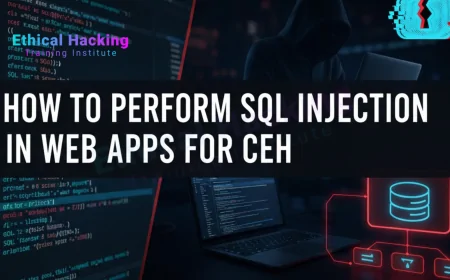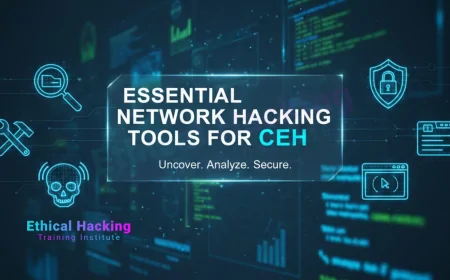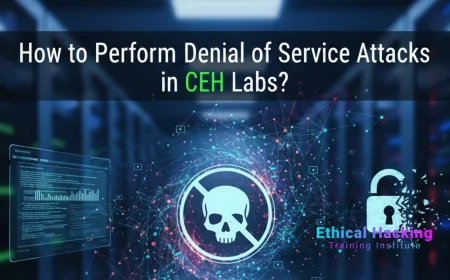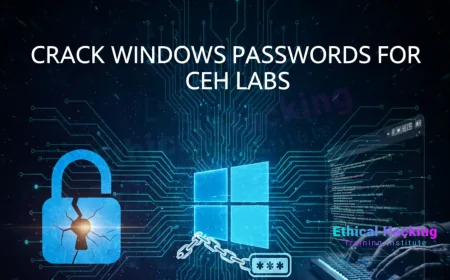What’s New in CEH V13: Updates You Should Know About | CEH v13 Updates Explained: What’s New and Why It Matters
Discover the latest updates in CEH v13, including new hacking tools, cloud security labs, MITRE ATT&CK integration, and hands-on training. Learn what’s changed from CEH v12 and how to prepare for the CEH v13 exam in 2025.
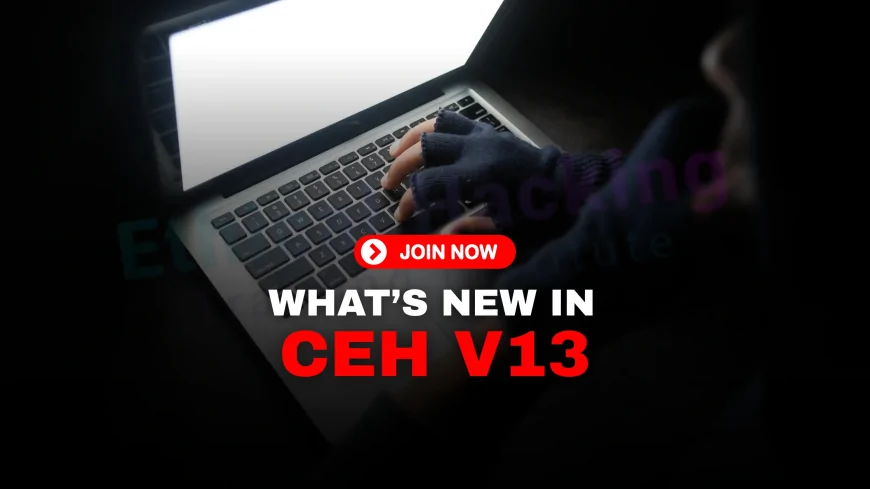
Table of Contents
- Introduction
- What is CEH?
- Why the New Version Matters in 2025
- Key Updates in CEH v13
- Comparison with CEH v12
- Updated Tools and Techniques
- Focus on Cloud Security
- New Labs and Hands-on Practice
- Emerging Threats Covered in v13
- New Domains and Topic Highlights
- CEH v13 Exam Structure and Format
- Who Should Take CEH v13?
- Career Impact of CEH v13
- Cost and Certification Options
- CEH Practical vs CEH v13
- Preparation Resources for CEH v13
- Pros and Cons of CEH v13
- Industry Acceptance in 2025
- FAQs
- Conclusion
Introduction
As cyber threats continue to evolve, the Certified Ethical Hacker (CEH) certification remains one of the most trusted credentials in the cybersecurity industry. In 2024, EC-Council released CEH v13—a major update packed with new tools, labs, and content to keep pace with the ever-changing threat landscape. If you’re planning to get CEH certified in 2025, this version is your gateway to a more robust and practical skillset.
What is CEH?
CEH stands for Certified Ethical Hacker. Offered by EC-Council, it validates the skills of ethical hackers in areas such as footprinting, system hacking, malware threats, and penetration testing. It's globally recognized and often a requirement for roles in penetration testing and cyber defense.
Why the New Version Matters in 2025
CEH v13 reflects the most current threats and technologies in cybersecurity. With the rapid rise of cloud adoption, hybrid environments, AI-assisted malware, and ransomware-as-a-service, professionals need to upgrade their knowledge base to stay relevant. Version 13 integrates these realities, making it the most practical and relevant edition yet.
Key Updates in CEH v13
- 100% cloud-based labs and modules
- 20+ new hacking tools added
- Expanded focus on IoT and cloud security
- Real-world attack simulations with MITRE ATT&CK framework
- Improved hands-on approach with updated iLabs
Comparison with CEH v12
CEH v12 emphasized structured learning with Engage methodology and performance-based learning modules. CEH v13 takes that foundation and enhances it with:
- More scenario-based learning
- Cloud-native infrastructure
- Advanced threat intelligence modules
Updated Tools and Techniques
Version 13 introduces tools like:
- Shodan for IoT footprinting
- CloudSploit for AWS security analysis
- MSFvenom upgrades in Metasploit
- Updated Burp Suite capabilities
Focus on Cloud Security
One of the most significant advancements in CEH v13 is its deepened focus on cloud security—a much-needed upgrade reflecting the global shift to cloud-based infrastructure. As businesses increasingly adopt cloud platforms like AWS, Microsoft Azure, and Google Cloud, ethical hackers must understand how to exploit and defend these environments.
CEH v13 now includes dedicated modules and hands-on labs for identifying and mitigating cloud-specific vulnerabilities, such as:
- Misconfigured S3 buckets and exposed storage containers
- Privilege escalation through IAM (Identity and Access Management)
- Serverless function exploitation (e.g., AWS Lambda attacks)
- API-based attacks in cloud-native applications
- Cross-tenant data leakage and hypervisor escape risks
This cloud-centric update aligns with frameworks like MITRE ATT&CK for Cloud and the latest OWASP Cloud-Native Application Security Top 10. Learners are exposed to the latest tools including:
- CloudSploit – for scanning cloud misconfigurations
- Pacu – an AWS exploitation framework
- ScoutSuite – multi-cloud security auditing
- AzureHound – for Azure AD privilege escalation mapping
With these enhancements, CEH v13 ensures that professionals are not only equipped to handle traditional networks but are also prepared to secure modern cloud environments—an essential skill in 2025 and beyond.
New Labs and Hands-on Practice
iLabs now include browser-based practice environments without the need for setup. These cover:
- OWASP Top 10 vulnerabilities
- Active Directory exploitation
- Privilege escalation and lateral movement
Emerging Threats Covered in v13
CEH v13 brings new modules on:
- AI-powered phishing and malware
- Deepfake abuse and social engineering
- Zero-trust architecture bypasses
New Domains and Topic Highlights
In addition to traditional modules, CEH v13 includes:
- Cloud hacking fundamentals
- Supply chain attack analysis
- MITRE ATT&CK mapping
CEH v13 Exam Structure and Format
The CEH v13 exam by EC-Council is designed to assess both theoretical knowledge and practical ethical hacking skills aligned with real-world cyber threats. The format remains similar to previous versions but includes updated content to reflect the changes in CEH version 13.
CEH v13 (ANSI Exam)
- Exam Code: 312-50 (ECC Exam or Pearson VUE)
- Number of Questions: 125 multiple-choice questions
- Duration: 4 hours (240 minutes)
- Question Format: Multiple choice, scenario-based questions
- Passing Score: Varies by form (typically 60%–85%)
CEH Practical Exam (Optional)
- Duration: 6 hours
- Type: Performance-based, practical exam in a real hacking lab
- Tasks: Includes 20 real-world challenges in a cloud-based environment
- Requirement: Solve at least 17 of 20 challenges to pass
The CEH Practical exam is optional but highly recommended for professionals who want to validate their hands-on capabilities. It complements the knowledge tested in the MCQ-based CEH v13 exam.
Exam Domains Covered in CEH v13
- Information Security & Ethical Hacking Overview
- Footprinting and Reconnaissance
- Scanning Networks
- Enumeration
- Vulnerability Analysis
- System Hacking
- Malware Threats
- Sniffing, Social Engineering & Denial of Service
- Session Hijacking and Web Server Attacks
- Hacking Web Applications and Wireless Networks
- IoT, OT, and Cloud Hacking (NEW in v13)
- Cryptography and Network Security
- Cyber Laws, Risk Management, and Compliance
CEH v13’s exam structure offers a balance of theoretical and practical assessment to ensure that certified professionals are job-ready and familiar with current attack surfaces, tools, and defense techniques.
Who Should Take CEH v13?
This version is suitable for:
- IT professionals transitioning into cyber security
- Network and system administrators
- Penetration testers
- Security consultants
Career Impact of CEH v13
CEH v13 adds significant value to your resume in 2025. It opens opportunities for job roles like:
- Ethical Hacker
- Security Analyst
- SOC Analyst
- Red Team Specialist
Cost and Certification Options
CEH v13 course fees range from ₹45,000 to ₹80,000 depending on the delivery method. The exam voucher alone costs around ₹30,000. You can opt for:
- Self-study + voucher
- Instructor-led online training
- Bootcamps with iLabs access
CEH Practical vs CEH v13
While both CEH v13 and CEH Practical are offered by EC-Council, they assess different skill sets and serve different career purposes. Understanding their differences will help you choose the right path depending on your goals in ethical hacking or cybersecurity.
CEH v13 – Knowledge-Based Certification
The CEH v13 exam is a multiple-choice, theory-focused certification designed to validate a candidate's foundational knowledge of ethical hacking techniques, tools, and processes.
- Format: 125 MCQs (Multiple Choice Questions)
- Duration: 4 hours
- Environment: Online (via Pearson VUE or ECC Exam Center)
- Focus: Theoretical understanding of cyber threats, attack vectors, and defensive techniques
- Use Case: Ideal for entry-level roles or professionals seeking foundational knowledge and recognition
CEH Practical – Skills-Based Certification
The CEH Practical exam is a hands-on, performance-based test that requires solving real-world hacking scenarios in a virtual lab. It proves your practical ability to conduct ethical hacking assessments under pressure.
- Format: 20 real-world scenarios and challenges
- Duration: 6 hours
- Environment: Cloud-based interactive lab
- Focus: Practical skills in penetration testing, vulnerability assessment, exploitation, and post-exploitation
- Use Case: Best for job roles demanding hands-on experience (e.g., Penetration Tester, Red Team Specialist)
CEH v13 vs CEH Practical: At a Glance
| Feature | CEH v13 | CEH Practical |
|---|---|---|
| Exam Format | Multiple Choice (125 Questions) | Hands-On Labs (20 Challenges) |
| Duration | 4 Hours | 6 Hours |
| Assessment Type | Theory & Conceptual Understanding | Live Ethical Hacking Simulation |
| Delivery Mode | Online or Test Center | Online Cloud Lab |
| Certification Level | Intermediate | Advanced |
| Ideal For | Cybersecurity Enthusiasts, Beginners, IT Pros | Ethical Hackers, Red Teamers, Penetration Testers |
| Career Relevance | Foundation-Level Jobs | Hands-On Roles (Offensive Security) |
Should You Take Both?
Absolutely. While CEH v13 builds your knowledge base, the CEH Practical proves your abilities to employers. Many cybersecurity job postings now expect both knowledge + experience. Earning both certifications increases your credibility and prepares you for high-demand roles in 2025 and beyond.
Preparation Resources for CEH v13
- Official EC-Council courseware
- CEH v13 exam guide PDFs
- Practice labs via iLabs
- Mock tests on Cybrary, Udemy, and Skillset
Pros and Cons of CEH v13
Pros:
- Updated labs and tools
- Cloud and AI threat coverage
- Strong industry acceptance
Cons:
- Costly compared to alternatives
- Still includes multiple-choice questions
Industry Acceptance in 2025
As of 2025, the Certified Ethical Hacker (CEH v13) continues to hold strong industry recognition and remains one of the most sought-after cybersecurity certifications across both public and private sectors. With the inclusion of cloud security, hands-on labs, and real-world threat simulations, CEH v13 aligns more closely with the needs of today’s cybersecurity job market.
Accepted by Government and Military Agencies
The CEH certification is approved under the U.S. Department of Defense (DoD) 8570/8140 directive for roles such as Information Assurance Technician and Cybersecurity Analyst. This makes it a top requirement for professionals looking to work in government and defense-related cybersecurity positions.
Trusted by Fortune 500 Companies
Major global enterprises—such as IBM, Accenture, Infosys, Deloitte, Wipro, and Cognizant—consistently list CEH as a preferred or required credential for job roles including:
- Penetration Tester
- SOC Analyst
- Red Team Specialist
- Cybersecurity Engineer
- IT Security Auditor
Globally Recognized Across Regions
Whether in the United States, India, the Middle East, Europe, or Asia-Pacific, CEH v13 is recognized by multinational employers as a standard benchmark for ethical hacking proficiency. Its consistent curriculum and global exam delivery make it a portable credential for remote and international job opportunities.
High Demand Across Sectors
With an increasing number of cyberattacks targeting cloud infrastructure, healthcare systems, financial services, and critical infrastructure, certified ethical hackers are in high demand. Employers specifically seek candidates who are skilled in penetration testing, vulnerability assessments, and security hardening—areas thoroughly covered in CEH v13.
Boosts Career Opportunities
CEH v13 significantly improves your profile when applying for:
- Cybersecurity internships and graduate programs
- Mid-level promotions within security teams
- Freelance or bug bounty platforms (e.g., HackerOne, Bugcrowd)
- Roles in startups, SOCs, consulting, and incident response teams
CEH v13 vs Other Certifications
While CEH v13 may not be as hands-on as OSCP or as governance-focused as CISSP, it offers a strong middle ground. Its combination of theory, tools, and optional practical certification gives it **broad appeal** across multiple job categories and industries.
Conclusion
In 2025, CEH v13 is more relevant and respected than ever, thanks to its timely updates and practical approach. Whether you're applying to MNCs, cybersecurity firms, or government defense agencies, CEH v13 remains a trusted signal of your ethical hacking capability and readiness to take on today’s evolving cyber threats.
Frequently Asked Questions (FAQs)
1. What is CEH v13?
CEH v13 is the 2024–2025 version of the Certified Ethical Hacker certification by EC-Council, updated with new labs, tools, and cloud security modules.
2. How is CEH v13 different from CEH v12?
CEH v13 includes updated attack vectors, cloud security content, and browser-based iLabs. It also features new threats like AI-based attacks and deepfake social engineering.
3. Is CEH v13 suitable for beginners?
Yes, it is designed for entry-level and mid-level IT professionals who want to enter the cybersecurity field.
4. What topics are new in CEH v13?
Topics include cloud penetration testing, deepfake attacks, container security, and updated IoT exploitation techniques.
5. Is CEH v13 recognized globally?
Yes, CEH is recognized worldwide and is compliant with DoD 8570 requirements in the U.S.
6. What is the cost of CEH v13 certification?
Depending on the training mode, the cost ranges from ₹45,000 to ₹80,000 including course material and exam voucher.
7. Does CEH v13 include hands-on labs?
Yes, it includes over 50 browser-based labs simulating real-world attack environments.
8. How long is the CEH v13 exam?
The exam is 4 hours long and contains 125 multiple-choice questions.
9. What is CEH Practical?
CEH Practical is an optional hands-on exam to validate skills in a real penetration testing lab environment.
10. Can CEH v13 help me get a job?
Yes, CEH is widely accepted for roles like penetration tester, ethical hacker, and security analyst.
11. What tools are covered in CEH v13?
Tools include Nmap, Wireshark, Metasploit, Shodan, Burp Suite, and many more.
12. Are there any prerequisites for CEH v13?
No strict prerequisites, but having basic knowledge of networking and security is helpful.
13. Is CEH better than OSCP?
CEH is better for broad fundamentals; OSCP is preferred for deep, hands-on penetration testing expertise.
14. How can I prepare for CEH v13?
Use EC-Council’s official materials, labs, practice exams, and supplement with online tutorials or study groups.
15. Can I take CEH v13 online?
Yes, the exam and training are both available online through EC-Council’s iClass or accredited partners.
16. What job titles accept CEH?
Ethical Hacker, Penetration Tester, SOC Analyst, Cybersecurity Engineer, Security Auditor, and more.
17. Is CEH v13 difficult?
It’s moderately challenging. With dedicated study and practice, most candidates pass within 1–3 months of prep.
18. What is the validity of the CEH certificate?
CEH certification is valid for three years, with EC-Council encouraging Continuing Education Credits (ECE).
19. What happens if I fail the CEH exam?
You can retake the exam after a cooldown period. EC-Council may charge a retake fee.
20. Is CEH enough to get into cyber security?
CEH is a great entry point, but combining it with hands-on experience, projects, and other certifications strengthens your profile.
Conclusion
CEH v13 is not just an upgrade—it's a powerful reimagining of what ethical hacking certification should offer in today’s threat landscape. With a focus on real-world tools, cloud security, and hands-on skills, it equips you to tackle 2025's cyber challenges head-on. Whether you're beginning your journey or upgrading your credentials, CEH v13 is a worthy investment in your cybersecurity career.
What's Your Reaction?
 Like
0
Like
0
 Dislike
0
Dislike
0
 Love
0
Love
0
 Funny
0
Funny
0
 Angry
0
Angry
0
 Sad
0
Sad
0
 Wow
0
Wow
0







